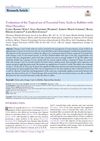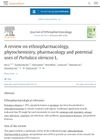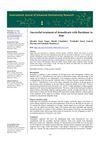 3 citations,
January 2017 in “Journal of cosmetology & trichology”
3 citations,
January 2017 in “Journal of cosmetology & trichology” The nutritional supplement improved hair quality and reduced hair loss.
 5 citations,
January 2014 in “International journal of gynaecology and obstetrics”
5 citations,
January 2014 in “International journal of gynaecology and obstetrics” HIV-positive pregnant women are more likely to experience severe bleeding, and a pregnant woman with familial hypertriglyceridemia had a successful early delivery with special care.
Proper nutrition and vitamins can boost the immune system and overall health in older adults.

Bee pollen, green tea, essential oils, and various plant extracts improve skin and hair health.
 36 citations,
May 2021 in “Nutrients”
36 citations,
May 2021 in “Nutrients” Natural molecules like inositols, resveratrol, vitamins, and omega-3 fatty acids may help manage Polycystic Ovary Syndrome (PCOS), but their effects vary and need more exploration.
 91 citations,
April 2017 in “Diabetes & Metabolic Syndrome: Clinical Research and Reviews”
91 citations,
April 2017 in “Diabetes & Metabolic Syndrome: Clinical Research and Reviews” Eating fewer calories, less sugar and refined carbs, and more low-glycemic and omega-3 rich foods can help manage PCOS symptoms.
 11 citations,
November 2022 in “JAMA dermatology”
11 citations,
November 2022 in “JAMA dermatology” Some nutritional supplements may help treat hair loss with generally mild side effects.
 December 2018 in “DergiPark (Istanbul University)”
December 2018 in “DergiPark (Istanbul University)” The cat's skin condition improved with treatment, but underlying health issues must be addressed.
 January 2017 in “Springer eBooks”
January 2017 in “Springer eBooks” Eating a balanced diet with specific nutrients can help manage menopause symptoms and prevent related health issues.
 July 2022 in “Research, Society and Development”
July 2022 in “Research, Society and Development” The conclusion is that different treatments improved hair growth in dogs with Alopecia X, but results varied and not all dogs had complete hair regrowth.
 April 2023 in “JIVA : journal of Indian Veterinary Association Kerala/JIVA :Journal of Indian Veterinary Association, Kerala”
April 2023 in “JIVA : journal of Indian Veterinary Association Kerala/JIVA :Journal of Indian Veterinary Association, Kerala” The dog fully recovered one month after treatment.

Eating healthy, exercising, and certain nutrients like myoinositol and omega-3s can help manage PCOS symptoms.
July 2021 in “Journal of scientific research and reports” Omega-3 fatty acids improve heart health, reduce inflammation, help joint and muscle conditions, and can improve skin disorders.
 1 citations,
December 2021 in “Pakistan biomedical journal”
1 citations,
December 2021 in “Pakistan biomedical journal” Eating certain seeds may help reduce symptoms of Polycystic Ovary Syndrome.
 July 2018 in “International journal of clinical & experimental dermatology”
July 2018 in “International journal of clinical & experimental dermatology” Eat a balanced diet for healthy hair; only use supplements if you have a proven nutrient deficiency.
 38 citations,
January 2015 in “Journal of Cosmetic Dermatology”
38 citations,
January 2015 in “Journal of Cosmetic Dermatology” The nutritional supplement improved hair density and reduced hair loss in women with female pattern hair loss.
 May 2023 in “Pharma innovation”
May 2023 in “Pharma innovation” Certain plant oils are good for heart health and weight control but need protection before use in foods.
 53 citations,
January 2017 in “BioMed research international”
53 citations,
January 2017 in “BioMed research international” Genetically modified plants could be an important source of omega-3 fats to meet global needs.
 239 citations,
July 2002 in “Clinical and Experimental Dermatology”
239 citations,
July 2002 in “Clinical and Experimental Dermatology” Low iron and L-lysine levels can cause hair loss in women, and increasing these nutrients can reduce hair shedding.
 7 citations,
May 2016 in “SpringerPlus”
7 citations,
May 2016 in “SpringerPlus” Some breast cancer patients on hormone therapy experience hair loss, and treatments like certain topical inhibitors and supplements may help without harming their cancer prognosis.
 January 2021 in “Research journal for veterinary practitioners”
January 2021 in “Research journal for veterinary practitioners” The document does not determine if essential fatty acids improve rabbit skin health.

The document concludes that hair loss in women is complex, often linked to aging, health conditions, and nutritional deficiencies, and emotional impacts should not be underestimated.
 April 2014 in “Journal of evolution of medical and dental sciences”
April 2014 in “Journal of evolution of medical and dental sciences” Women over forty can maintain skin and hair health with lifestyle and dietary changes.
 39 citations,
September 2013 in “Journal of Cosmetic Dermatology”
39 citations,
September 2013 in “Journal of Cosmetic Dermatology” Herbs can potentially treat hair loss by inhibiting a key enzyme and promoting hair growth, and deficiencies in zinc, biotin, and iron are linked to hair loss.
18 citations,
July 2016 in “Clinics in dermatology” Nutrition affects skin health differently based on age and condition.
 1 citations,
October 2012 in “Medical Hypotheses”
1 citations,
October 2012 in “Medical Hypotheses” The conclusion suggests that treatments targeting root causes of chronic diseases may be developed by focusing on gene expression and lifestyle factors.
 5 citations,
September 2023 in “Journal of ethnopharmacology”
5 citations,
September 2023 in “Journal of ethnopharmacology” Purslane has many health benefits and potential uses in medicine, food, and farming.
7 citations,
January 1991 in “Comparative biochemistry and physiology. A. Comparative physiology” A diet high in vitamin E improved blood health, skin, and fur in common marmosets.
 January 2024 in “International journal of advanced biochemistry research”
January 2024 in “International journal of advanced biochemistry research” Fluralaner successfully treated dogs with severe demodicosis in 2 months.
 1 citations,
April 2019 in “Endokrynologia Polska”
1 citations,
April 2019 in “Endokrynologia Polska” Healthy diet and exercise are important for women with PCOS to manage weight and metabolic issues, and supplements like omega-3, vitamin D, and inositol may help.


























